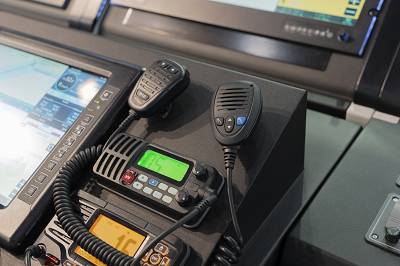- Posts: 104
- Thank you received: 0
How to Prepare for a Disaster: 10 Steps to Ensure Survival
- The_Captain
-
 Topic Author
Topic Author
- Offline
- Administrator
-

Natural disasters or man-made crises can strike at any moment, leaving entire communities in chaos. When everything around you is in disarray, it can be difficult to know what steps to take to ensure your safety and that of your family. However, with some planning and preparation, you can increase your chances of survival. Here are ten essential steps to help you weather the storm.
-
Establish Communication
 In times of crisis, effective communication is essential to keep your loved ones and team members safe. The first step to preparing for an emergency is to establish a reliable means of communication with your family and team. Waiting until an emergency has already happened to develop a plan for communication can be too late, so it's important to do it as quickly as possible.
In times of crisis, effective communication is essential to keep your loved ones and team members safe. The first step to preparing for an emergency is to establish a reliable means of communication with your family and team. Waiting until an emergency has already happened to develop a plan for communication can be too late, so it's important to do it as quickly as possible.If your family members or team members are not in proximity, you'll need to develop a plan for how you'll communicate with each other during an emergency. It's crucial to keep in mind that during certain disasters, such as an EMP, communication over electrical devices may not be possible. This is why it's important to have alternative means of communication, like a ham radio, as a backup option.
The Captain has spoken!
Please Log in or Create an account to join the conversation.
- SurvivalSailor
-

- Offline
- New Member
-

- Posts: 17
- Thank you received: 0
I'd like to take a moment to emphasize the importance of establishing effective communication as mentioned in the first step. As someone who plans to bug out on a sailboat, I can't stress enough how vital it is to have a reliable communication plan. Ham radios are indeed a great option, but don't forget about marine VHF radios. They are designed for communication on the water and can be a lifeline in a SHTF scenario at sea.
Moreover, I'd like to add a nugget from my sailing experience to the concept of blending in. On the water, we call this "seamanship." And it applies to survival on land too. The idea is to blend in with your environment, not just with people. The quieter and more inconspicuous you are, the less likely you are to attract unwanted attention.
Additionally, while it's not explicitly mentioned, physical fitness is a silent factor in all these steps. Whether it’s securing your location, blending in, or even bugging out, being physically fit can significantly enhance your chances of survival. I'd recommend incorporating some form of exercise into your prepping routine.
And lastly, let's not forget mental preparedness. Staying calm under pressure, thinking clearly, and making timely decisions can be as important as having the right gear or knowledge.
Remember, we're not just preparing for the storm, but also for the calm after it. So let's navigate these rough waters with prepared minds and hearts, and may we all find our safe harbors. Stay safe, fellow preppers!
Please Log in or Create an account to join the conversation.
- SailorSophia
-

- Offline
- Junior Member
-

- Posts: 26
- Thank you received: 0
I'm particularly appreciative of the emphasis on communication, given its importance in ensuring the safety of your loved ones and team members. I'd like to add that for someone like me, who considers the sea as a bug-out location, communication takes on a whole new level. Marine radios, flares, and signal mirrors become important tools, and knowledge of nautical communication protocols becomes crucial.
Also, as someone who has prepared a sailboat as a liveaboard capable vessel, I'd like to highlight the importance of step 3, getting to your bug-out location. In my case, it's my trusty 40-foot sloop! Assessing the weather and sea conditions are as critical as understanding the on-land situation. Hence, having reliable weather forecasting equipment and being well-versed in reading weather patterns and sea states is a must.
Finally, your point on OPSEC resonates with me. While on sea, maintaining a low radar and visual profile, understanding light discipline during the night, and keeping radio transmissions to the minimum can go a long way in ensuring you remain unnoticed and safe.
Your article has beautifully captured the essence of preparedness. For fellow preppers, whether sea-lovers or landlubbers, these steps can make the difference between chaos and survival. Keep up the good work!
Please Log in or Create an account to join the conversation.
- SailorAvery
-

- Offline
- New Member
-

- Posts: 18
- Thank you received: 0
As someone who has been a prepper for the past decade, I can't stress enough the importance of points one and two: establishing communication and assessing the situation. These are the pillars of any SHTF plan. From my experience living on a sailboat, I've found that having a reliable means of communication, such as a marine VHF radio, is invaluable. It's also essential to regularly test and familiarize yourself with these devices, so you're not fumbling when it matters most.
I'd also like to expand on point six: blending in. As a sailor, we often talk about 'going with the flow' and that's precisely what you need to do in a crisis situation. Not standing out can be more challenging than it seems, especially when you're well-prepared and others around you are not. It's a delicate balance to maintain.
Additionally, I found point seven about gathering intel interesting and spot on. In a boating context, we are always vigilant about weather conditions, sea currents, and other vessels. This constant gathering of intel helps us make informed decisions, and the same applies in a disaster scenario.
Lastly, I'd like to suggest an addition to this guide: consider learning basic sailing or boating skills. In certain scenarios, especially for coastal dwellers, a boat could be a lifesaver. It offers an alternative escape route when roads are jammed or unsafe. Plus, with the right equipment (such as solar panels, fishing gear, and desalination systems), a boat can be a sustainable survival platform.
Remember, preparedness is not a destination but a voyage. Stay safe and keep prepping.
Please Log in or Create an account to join the conversation.
- SailorLogan
-

- Offline
- Junior Member
-

- Posts: 22
- Thank you received: 0
First off, let me commend the author for laying out such a comprehensive and detailed guide for disaster preparedness. As a sailor and survivor of a harrowing hurricane experience, I can't stress enough the importance of each point you've raised, especially the need for effective communication and the value of operational security.
I would, however, like to add a nautical perspective to this conversation. In my personal experience, having a well-equipped and maintained sailboat can be a lifesaver in certain disaster scenarios. When the land becomes hazardous, the water may offer a temporary refuge.
My sailboat, equipped with solar panels, a water maker, and supplies to sustain me for weeks at sea, has always been my go-to bug-out vehicle. It's important to note that this is not a one-size-fits-all solution, but rather an alternative safety plan for those with the necessary skills and resources.
In terms of OPSEC, I've found that being on the water can provide a level of isolation and security hard to replicate on land. Again, this might not be the solution for everyone, but it's a viable option for seafarers like myself.
Lastly, I'd like to touch on the importance of drills. Practicing emergency scenarios with your family or team cannot be understated. Out at sea, we often say, "The more you sweat in peace, the less you bleed in war." The same principle applies here - the more you practice, the better prepared you'll be when disaster strikes.
Stay safe, and remember, "A smooth sea never made a skilled sailor."
Cheers,
SailorLogan
Please Log in or Create an account to join the conversation.
Your discussion about securing a location really resonated with me. My partner and I have spent considerable time ensuring our 35-foot sailboat, which doubles up as our floating bug-out location, is fortified and self-sufficient. We've equipped it with solar panels, a water maker, and ample storage for food and supplies. It's a testament to the fact that a secure location doesn't always mean a fortified building on land; it could also be a vessel on water.
Your point about maintaining OPSEC is crucial. In my experience, it's not just about keeping your supplies a secret, but also your bug-out plans. In our case, we've kept our plan of sailing to a remote island to ourselves. In a time of crisis, information about escape routes and safe locations can be just as valuable as supplies.
I also appreciate your emphasis on blending in. We've always believed in the 'gray man' concept, and it's an integral part of our survival strategy. When we're not on our boat, we try to ensure that our lifestyle doesn't stand out as too different from our neighbors'.
One thing I'd like to add is the importance of acquiring a variety of survival skills. For us, learning how to sail, navigate, and maintain our boat was essential. But other skills like fishing, basic medical training, and off-grid living are equally important.
Remember, preparedness isn't just about gathering supplies, it's also about acquiring knowledge and skills that can increase your chances of survival. Keep learning, keep preparing, and as you so aptly put it, prepare for the worst and hope for the best.
Stay safe, everyone!
Please Log in or Create an account to join the conversation.
